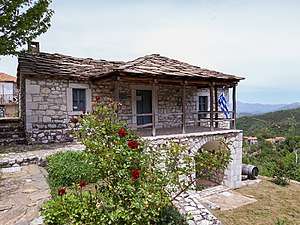Battle of Doliana
The Battle of Doliana took place during the Greek War of Independence on 18 May 1821.
| Battle of Doliana | |||||||
|---|---|---|---|---|---|---|---|
| Part of the Greek War of Independence | |||||||
 The house in which Nikitaras was fort upped has been transformed into a museum | |||||||
| |||||||
| Belligerents | |||||||
|
|
| ||||||
| Commanders and leaders | |||||||
|
|
| ||||||
| Strength | |||||||
| 2,500-3,000 men | 6,000 soldiers, 2 cannons | ||||||
| Casualties and losses | |||||||
| 70 dead and artillery | |||||||
Battle
After the Turkish defeat at the battle of Valtetsi, the Turkish leader Kâhya Mustafa Bey decided to attack and destroy the Greek camp of Vervena where 2,500 armed Greeks had gathered and its destruction would seriously damage Greek morale.[1]
So, during the night of 17 - 18 May, an Ottoman force of six thousand men and two cannons marched from Tripolis, against Vervena.[2] The plan could succeed if the Ottoman army could pass Doliana; where Nikitaras was with two hundred or so men. By the time the Ottomans reached him he had fortified some houses and ordered fire against them. The Ottoman army was surprised by Nikitaras and the troops panicked.[3] Meanwhile at Vervena a part of the Turkish army arrived but it was forced to retreat because the troops of the camp, realising the danger, attacked the Ottomans and flanked them. Due to the increasing casualties, Mustafa Bey retreated but the Greeks kept hunting them down until Tripoli. According to Kolokotronis, the Ottomans lost seventy men and left on the battlefield much booty with the cannons that were left there after the death of the artillery's chief at the beginning of the battle.[4]
Nikitaras, who had up to that point lived in the shadow of his uncle Theodoros Kolokotronis, earned a name for himself and the nickname "Tourkofagos" (Greek: Τουρκοφάγος) (Turk-eater). Legend says that after the battle his sword got stuck to his hand and could not be removed.[5]
Significance
The victorious Battle of Doliana was a big morale boost for the irregular Greek army. It marked the last time the besieged Ottoman army left Tripoli, and it opened the way for the fall of the city and the firm establishment of the independence movement in the Peloponnese.
References
- Citations
- According to Spyridon Trikoupis
- Paparigopoulos, K, History of the Greek Nation (Greek edition), vol. 6, p. 54
- Paparigopoulos, K, History of the Greek Nation (Greek edition), vol. 6, p. 54
- According to Th. Kolokotronis' Memoirs
- Paparigopoulos, K, History of the Greek Nation (Greek edition), vol. 6, p. 54
- Bibliography
Paparigopoulos, Konstantinos, History of the Greek Nation (Greek edition), vol. 6, p.54
This article uses text taken from Phantis.com, a GFDL wiki.